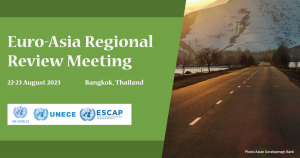
A high-level meeting to review the progress of the Vienna Programme of Action for Landlocked Developing Countries (VPoA) in Europe and Asia is kicking off in Bangkok.
Over the course of two days (22 - 23 August), senior United Nations and government officials, representatives from transit countries, development system partners, international financial institutions and the private sector will gather to assess the progress made by Landlocked Developing Countries (LLDCs) in the region over the past decade and propose new partnerships and innovative solutions to accelerate their path to development.
Asia and Europe are home to 14 LLDCs that grapple with a series of development challenges owing to their lack of direct territorial access to the sea. Remoteness from major markets and limited infrastructure increase their transportation costs, hindering their full participation in international trade and posing significant economic challenges, against the backdrop of ongoing global macroeconomic tensions and the aftermath of the COVID-19 pandemic.
"Europe and Asia’s landlocked developing countries are locked out from international trade, connectivity, and consequently, economic development. Today’s meeting marks a decisive effort to address the unique challenges that these countries face,” said Rabab Fatima, United Nations High Representative for the Least Developed Countries, Landlocked Developing Countries, and Small Island Developing States, and Secretary-General for the Third UN Conference on Landlocked Developing Countries. “The meeting will also provide an opportunity to evaluate progress and identify actions to expedite the sustainable development of Europe and Asia's LLDCs and ensure they are not left behind," she added.
“Many of the challenges faced by LLDCs can be mitigated, if not addressed, through dialogue and cooperation,” said Armida Salsiah Alisjahbana, Executive Secretary of the United Nations Economic and Social Commission for Asia and the Pacific (ESCAP). She added, “A shared understanding of transit policy issues, infrastructure development, international trade and trade facilitation, regional integration and cooperation and structural economic transformation all starts with dialogue. Such dialogues then form the foundation for action.”
For her part, Ms Olga Algayerova, Executive Secretary of the United Nations Economic Commission for Europe (UNECE) highlighted the high trade costs faced by Landlocked Developing Countries compared to their coastal counterparts, “trade costs in Landlocked Developing Countries are 1.4 times higher than in coastal developing countries. I encourage all LLDCs in the Euro-Asian region to continue efforts to harness UN transport conventions and trade facilitation tools, which can significantly lower costs, open new economic opportunities and boost connectivity as drivers for sustainable development.”
The Euro-Asia regional review meeting is the final of three regional review meetings leading up to the Third UN Conference on Landlocked Developing Countries, scheduled for Kigali, Rwanda, in 2024. The first regional meeting for African LLDCs was held in Gaborone, Botswana, in May, and the second meeting for Latin America LLDCs was held in Asuncion, Paraguay, in July.
The meeting in Bangkok will culminate in an outcome document with concrete action-oriented recommendations that will provide invaluable inputs to the preparatory process of the Third United Nations Conference on LLDCs.
Notes to editors
For more information, visit the conference website or contact Sithembile Hillary Siziba, Public Information Officer, Office of the High Representative for the Least Developed Countries, Landlocked Developing Countries and Small Island Developing States: [email protected]

